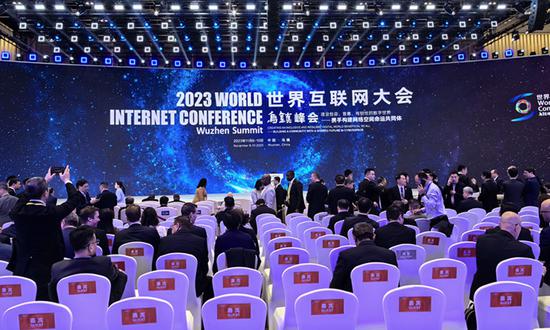China releases research paper on developing responsible generative AI

The opening ceremony of the 2023 World Internet Conference Wuzhen Summit is about to begin at the Wuzhen International Internet Exhibition & Convention Center in Wuzhen, Zhejiang Province. (Photo/Yang Sheng/GT)
The 2023 World Internet Conference (WIC) on Thursday issued the "Developing Responsible Generative Artificial Intelligence (AI) Research Paper and Consensus" in Wuzhen, East China's Zhejiang Province, summarizing the development of global generative AI to date as well as opportunities and risks brought by the emerging technology.
The report represents a fresh effort from China to provide a reference for all stakeholders on AI development, as well as to promote and coordinate AI governance and build an open, fair and effective technological environment for the benefit of the world, observers said.
According to the report, the fast-lane development of generative AI is a combined result of improvements in models, data and hashrate. The gradual implementation of the technology will be conducive to global economic growth. It can also facilitate social progress and help public welfare and scientific research.
The report cited a prediction by McKinsey & Co that generative AI could increase global GDP by $2.6 trillion to $4.4 trillion. Also, research by Goldman Sachs found that breakthroughs in generative AI could raise global GDP growth by 7 percent in ten years.
However, the report also noted a number of challenges in security and ethics associated with generative AI. Inequality in its development could potentially widen gaps in growth, so the report called for global efforts to develop "responsible" generative AI. It highlighted the input from global organizations and individual countries in guiding and regulating the development of generative AI.
The report was released at a sub-forum titled "AI empowering industrial development" at the 2023 WIC Wuzhen Summit, which kicked off on Wednesday and runs until Friday.
China is a leading player in drafting AI regulations. The country has rolled out multiple measures this year to coordinate sound development of the AI sector while safeguarding national security. It also launched the Global AI Governance Initiative in October, stressing fairness and nondiscrimination in AI development.
Amid a white-hot global race, Chinese firms have been stepping up efforts to launch and upgrade AIGC products. Chinese tech giant Baidu launched AI chatbot Ernie Bot to the general public, making it one of the first domestic players to join the race. Since opening to the public in August, Ernie Bot now has over 70 million users and has developed 4,300 application scenarios, Wang Haifeng, Baidu's chief financial officer, told the Global Times on Thursday.
Other leading Chinese companies such as 360 Security Technology and iFlytek have also released AI models to the public.
The report contains a chapter listing ten consensuses on developing responsible AI. For example, it urged relevant stakeholders to prevent the abuse and malicious use of the technology, and to strengthen data security, protection of personal information and privacy. It also called for the establishment of a system to ensure that relevant parties can be tracked and held accountable when damage is caused by generative AI.
